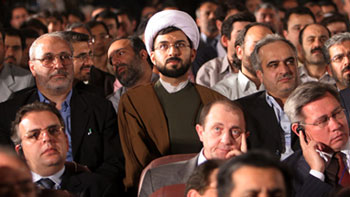- When the facts on Iran don’t match the rhetoric (FCN, 10-21-2006)
- Iran showdown tests power of ‘Israel lobby’ (FCN, 04-26-2006)
- Iranian ambassador sets the record straight (FCN, 04-07-2006)
- Nuclear hypocrisy in Iran’s treatment (FCN, 03-12-2006)
- How America crushed democracies (FCN, 08-28-2003)
- How the U.S. Government destabilized foreign governments (FinalCall.com News)

UNITED NATIONS (FinalCall.com) – Iran announced on Apr. 9 that it has started enriching uranium on an industrial scale, which observers say raises the stakes in its confrontation with the United States and the UN Security Council.
In response, the State Department, through Secretary of State Condoleezza Rice’s spokesman Sean McCormack, said: “The transition to industrial-scale enrichment amounts to a missed opportunity, and sends another signal that Tehran is defying the international community.”
As the matter stands, Iran has until the end of May to comply with the latest UN demand for a suspension of enrichment activities, or face “further appropriate measures.” The deadline was established with the passing of Security Council resolution 1747 on Mar. 24, which banned Iranian arms exports and a freezing of the assets of 28 individuals and organizations involved in Iran’s nuclear and missile programs. It would also impose restrictions on travel by individuals subject to sanctions, as well as on arms sales and financial assistance to the Iranian government.
“UNSC resolution 1747, imposing sanctions on Tehran, provided a clarity that had been lacking so far: an international consensus in favor of containment,” states an editorial in the Australian Financial Review.
Robert E. Hunter, who served on former President Jimmy Carter’s National Security staff as chief of Middle East Affairs, in a March interview with the Council on Foreign Relations noted, “One of the problems that we’re having, particularly in the United States, is we have not yet figured out what it is we really want from Iran.” When asked if he felt there are still people in the Bush administration pushing for some type of military attack against Iran, he stated, “The people who have been most concerned about Iran, about limiting its power and influence as well as everything else, have shifted ground to a higher emphasis on the nuclear thing, but secondly, have moved over to the idea of permanent containment.”
The new resolution invokes Chapter 7, Article 41, of the United Nations charter, rendering most of the provisions mandatory, but excluding military action. A sanctions category in the resolution calls on nations and international organizations not to enter into new commitments for export credits, grants or loans to Iran except in the case of humanitarian or development projects. Analysts say this new round of sanctions is unlikely to hurt Iran, serving more as a signal to Tehran that worse could come.
Former UN nuclear inspector David Albright told the Daily Times in Pakistan the new sanctions represent an incremental move, rather than a major escalation. “They are not expected to turn Iran around, but are expected to send a signal to Iran that this could isolate you; hurt you economically in the long run,” Mr. Albright said.
Michael Spies of the New York-based Lawyers Committee on Nuclear Policy agrees that Resolution 1747 represents the “go slow” attitude of the sponsors, but adds that some of the measures in the resolution’s amendments are “somewhat suspect.”
Mr. Spies called attention to the non-binding language in the resolution covering trading arms with Iran.
“While it calls upon all states ‘to exercise vigilant restraint,’ and seems harmless, these measures correlate with steps the U.S. would take in preparation for war–rather than something that might further non-proliferation objectives,” Mr. Spies said. He also noted that the amendments mentioned provide large-scale conventional weapons systems to Iran, specifically battle tanks, armored combat vehicles, missiles and missile systems.
“The U.S. is taking action through the resolution which would possibly impede Iran’s ability to defend against an attack from a major power, and that seems overly proactive,” Mr. Spies stressed.
Ray Takeyh, senior fellow at the Council on Foreign Relations, and author of the book “Hidden Iran: Paradox and Power in the Islamic Republic,” writing in Foreign Affairs magazine for the March/April issue stated: “The U.S. must re-think its strategy from the ground up. The Islamic Republic is not going away anytime soon, and its growing regional influence cannot be limited. Washington must eschew superficially appealing military options, and its policy of containing Iran in favor of detente.”
However, hawks such as former U.S. ambassador to the UN, John Bolton, insist that the only way to stop Iran’s nuclear program is a “regime change.”
In an interview with SME out of Vienna, Mr. Bolton argues that a “military operation against Iran is more reasonable that the existence of a nuclear-armed Islamic state.” According to the former ambassador, the leadership of Iran is “determined not to abandon its nuclear program and the new UN resolution will not discourage it from its plans to obtain a nuclear weapon.”












